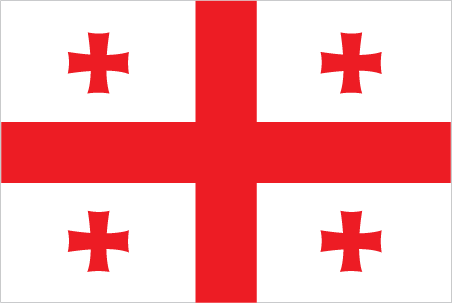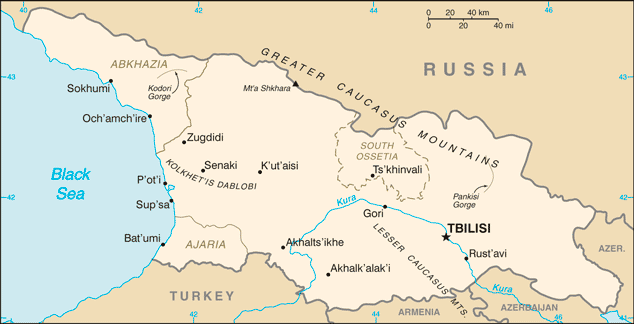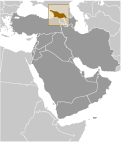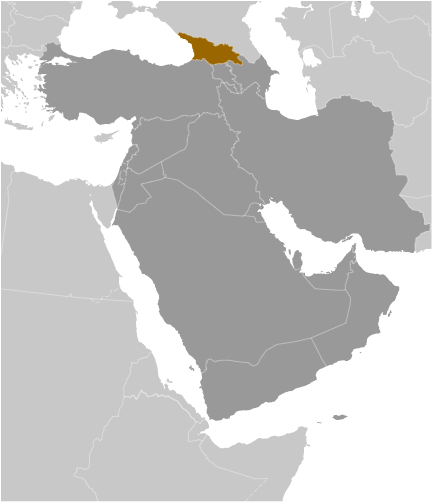|

Administrative divisions (GPS Maps)
Geography
People and Society
Government
Economy
Communications
Transportation
Military |
 |
 The region of present day Georgia contained the ancient kingdoms of Colchis and Kartli-Iberia. The area came under Roman influence in the first centuries A.D. and Christianity became the state religion in the 330s. Domination by Persians, Arabs, and Turks was followed by a Georgian golden age (11th-13th centuries) that was cut short by the Mongol invasion of 1236. Subsequently, the Ottoman and Persian empires competed for influence in the region. Georgia was absorbed into the Russian Empire in the 19th century. Independent for three years (1918-1921) following the Russian revolution, it was forcibly incorporated into the USSR in 1921 and regained its independence when the Soviet Union dissolved in 1991. Mounting public discontent over rampant corruption and ineffective government services, followed by an attempt by the incumbent Georgian government to manipulate national legislative elections in November 2003 touched off widespread protests that led to the resignation of Eduard SHEVARDNADZE, president since 1995. In the aftermath of that popular movement, which became known as the "Rose Revolution," new elections in early 2004 swept Mikheil SAAKASHVILI into power along with his United National Movement party. Progress on market reforms and democratization has been made in the years since independence, but this progress has been complicated by Russian assistance and support to the separatist regions of Abkhazia and South Ossetia. Periodic flare-ups in tension and violence culminated in a five-day conflict in August 2008 between Russia and Georgia, including the invasion of large portions of undisputed Georgian territory. Russian troops pledged to pull back from most occupied Georgian territory, but in late August 2008 Russia unilaterally recognized the independence of Abkhazia and South Ossetia and Russian military forces remain in those regions. The region of present day Georgia contained the ancient kingdoms of Colchis and Kartli-Iberia. The area came under Roman influence in the first centuries A.D. and Christianity became the state religion in the 330s. Domination by Persians, Arabs, and Turks was followed by a Georgian golden age (11th-13th centuries) that was cut short by the Mongol invasion of 1236. Subsequently, the Ottoman and Persian empires competed for influence in the region. Georgia was absorbed into the Russian Empire in the 19th century. Independent for three years (1918-1921) following the Russian revolution, it was forcibly incorporated into the USSR in 1921 and regained its independence when the Soviet Union dissolved in 1991. Mounting public discontent over rampant corruption and ineffective government services, followed by an attempt by the incumbent Georgian government to manipulate national legislative elections in November 2003 touched off widespread protests that led to the resignation of Eduard SHEVARDNADZE, president since 1995. In the aftermath of that popular movement, which became known as the "Rose Revolution," new elections in early 2004 swept Mikheil SAAKASHVILI into power along with his United National Movement party. Progress on market reforms and democratization has been made in the years since independence, but this progress has been complicated by Russian assistance and support to the separatist regions of Abkhazia and South Ossetia. Periodic flare-ups in tension and violence culminated in a five-day conflict in August 2008 between Russia and Georgia, including the invasion of large portions of undisputed Georgian territory. Russian troops pledged to pull back from most occupied Georgian territory, but in late August 2008 Russia unilaterally recognized the independence of Abkhazia and South Ossetia and Russian military forces remain in those regions. |
|
Advertisements
|
Advertisements
|
Airports World Ranking: 134
22 (2012)
Airports - with paved runways
Total 18
Over 3,047 m 1
2,438 to 3,047 m 7
1,524 to 2,437 m 3
914 to 1,523 m 5
Under 914 m 2 (2012)
Airports - with unpaved runways
Total 4
1,524 to 2,437 m 1
914 to 1,523 m 2
Under 914 m 1 (2012)
Heliports
2 (2012)
Pipelines
Gas 1,596 km; oil 1,258 km (2010)
Railways World Ranking: 78
Total 1,612 km Broad gauge 1,575 km 1.520-m gauge (1,575 electrified) Narrow gauge 37 km 0.912-m gauge (37 electrified) (2008)
Roadways World Ranking: 109
Total 20,329 km Paved 19,123 km (includes 13 km of expressways) Unpaved 1,206 km (2006)
Merchant marine World Ranking: 40
Total 142 By type Bulk carrier 13, cargo 114, chemical tanker 1, container 1, liquefied gas 1, passenger/cargo 1, petroleum tanker 3, refrigerated cargo 1, roll on/roll off 5, vehicle carrier 2 Foreign-owned 95 (Bulgaria 1, China 10, Egypt 7, Hong Kong 3, Israel 1, Italy 2, Latvia 1, Lebanon 1, Romania 7, Russia 6, Syria 24, Turkey 14, UAE 2, UK 5, Ukraine 10, US 1) Registered in other countries 1 (unknown 1) (2010)
Ports and terminals
Bat'umi, P'ot'i
Transportation - note
Large parts of transportation network are in poor condition because of lack of maintenance and repair
--- There are no comments yet ---
Add a new comment:
|
Advertisement
Members area
Georgia (Tbilisi):
GPS points from Georgia (Tbilisi)
|




 The region of present day Georgia contained the ancient kingdoms of Colchis and Kartli-Iberia. The area came under Roman influence in the first centuries A.D. and Christianity became the state religion in the 330s. Domination by Persians, Arabs, and Turks was followed by a Georgian golden age (11th-13th centuries) that was cut short by the Mongol invasion of 1236. Subsequently, the Ottoman and Persian empires competed for influence in the region. Georgia was absorbed into the Russian Empire in the 19th century. Independent for three years (1918-1921) following the Russian revolution, it was forcibly incorporated into the USSR in 1921 and regained its independence when the Soviet Union dissolved in 1991. Mounting public discontent over rampant corruption and ineffective government services, followed by an attempt by the incumbent Georgian government to manipulate national legislative elections in November 2003 touched off widespread protests that led to the resignation of Eduard SHEVARDNADZE, president since 1995. In the aftermath of that popular movement, which became known as the "Rose Revolution," new elections in early 2004 swept Mikheil SAAKASHVILI into power along with his United National Movement party. Progress on market reforms and democratization has been made in the years since independence, but this progress has been complicated by Russian assistance and support to the separatist regions of Abkhazia and South Ossetia. Periodic flare-ups in tension and violence culminated in a five-day conflict in August 2008 between Russia and Georgia, including the invasion of large portions of undisputed Georgian territory. Russian troops pledged to pull back from most occupied Georgian territory, but in late August 2008 Russia unilaterally recognized the independence of Abkhazia and South Ossetia and Russian military forces remain in those regions.
The region of present day Georgia contained the ancient kingdoms of Colchis and Kartli-Iberia. The area came under Roman influence in the first centuries A.D. and Christianity became the state religion in the 330s. Domination by Persians, Arabs, and Turks was followed by a Georgian golden age (11th-13th centuries) that was cut short by the Mongol invasion of 1236. Subsequently, the Ottoman and Persian empires competed for influence in the region. Georgia was absorbed into the Russian Empire in the 19th century. Independent for three years (1918-1921) following the Russian revolution, it was forcibly incorporated into the USSR in 1921 and regained its independence when the Soviet Union dissolved in 1991. Mounting public discontent over rampant corruption and ineffective government services, followed by an attempt by the incumbent Georgian government to manipulate national legislative elections in November 2003 touched off widespread protests that led to the resignation of Eduard SHEVARDNADZE, president since 1995. In the aftermath of that popular movement, which became known as the "Rose Revolution," new elections in early 2004 swept Mikheil SAAKASHVILI into power along with his United National Movement party. Progress on market reforms and democratization has been made in the years since independence, but this progress has been complicated by Russian assistance and support to the separatist regions of Abkhazia and South Ossetia. Periodic flare-ups in tension and violence culminated in a five-day conflict in August 2008 between Russia and Georgia, including the invasion of large portions of undisputed Georgian territory. Russian troops pledged to pull back from most occupied Georgian territory, but in late August 2008 Russia unilaterally recognized the independence of Abkhazia and South Ossetia and Russian military forces remain in those regions.